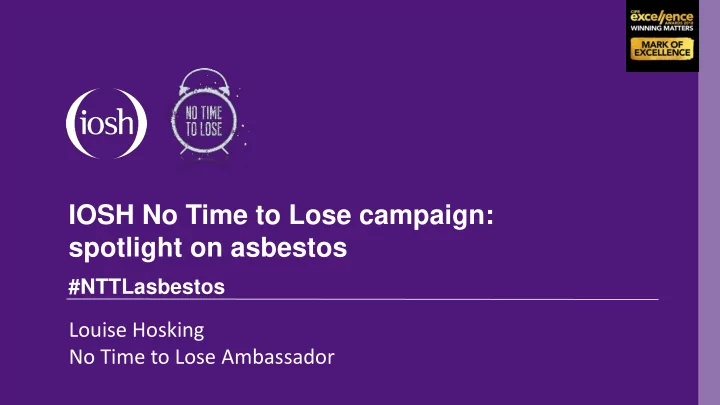

IOSH No Time to Lose campaign: spotlight on asbestos #NTTLasbestos Louise Hosking No Time to Lose Ambassador
About the Institution of Occupational Safety and Health (IOSH) www.iosh.com
• Enhance • Collaborate • Influence
No Time to Lose: campaign on occupational cancer
Occupational cancer Global estimate At least 742,000 people die every year from a work-related cancer – more than one death every minute . Source: ILO, Ministries of Finland and Singapore, WSH Institute Singapore, Finnish Institute of Occupational Health (FIOH), ICOH and EU-OSHA
Occupational cancer Research in Britain – first study of its kind - 8,000 work-related cancer deaths a year - 14,000 new cancer registrations each year are attributed to occupational exposure - Just under half of deaths linked to occupational cancer are in the construction industry Source: HSE ‘The burden of occupational cancer in Great Britain’, 2012, Dr Lesley Rushton
The No Time to Lose campaign aims to: - raise awareness of a significant health issue facing employees - offer businesses free practical, original materials to help them deliver effective prevention programmes - secure commitments from organisations to improve preventative measures
The four phases
Free practical materials www.notimetolose.org.uk
Spotlight on cancer caused by asbestos exposure at work
Asbestos-related cancer Global estimate 125 million people in the world are exposed to asbestos in the workplace. It claims between 100,000 and 200,000 lives every year. Source: World Health Organization
Asbestos-related cancer in Britain At least 5,000 people a year die from an asbestos-related cancer. Around 20 trade’s people die a week from cancer caused by asbestos exposure. Source: Health and Safety Executive
Where is asbestos banned? Algeria Denmark Ireland Monaco Slovakia Argentina Djibouti Israel Mozambique Slovenia Australia Egypt Italy Netherlands South Africa Austria Estonia Japan New Caledonia Spain Bahrain Finland Jordan New Zealand Sweden Belgium France Korea Norway Switzerland Brazil Gabon Kuwait Oman Taiwan Brunei Germany Latvia Poland Turkey Bulgaria Gibraltar Liechtenstein Portugal United Kingdom Canada Greece Lithuania Qatar Uruguay Chile Honduras Luxembourg Romania Croatia Hungary Macedonia Saudi Arabia Cyprus Iceland Malta Serbia Czech Republic Iraq Mauritius Seychelles Source: International Ban Asbestos Secretariat
Asbestos production and use Source: Statista
What is asbestos?
How small is asbestos?
Where can asbestos be found?
Who is at risk? Sole traders and young people are at high risk of exposure to asbestos.
The health risks - Pleural plaques - Pleural thickening - Asbestosis - Lung cancer - Mesothelioma
Number of Mesothelioma deaths in Britain
Symptoms to look out for - a persistent cough - a cough you have had for a while that gets worse - breathlessness - coughing up phlegm with traces of blood - an ache or pain in the chest or shoulder - loss of appetite or unexpected weight loss - tiredness
Eight steps to managing asbestos 1. Know where it is 2. Record where it is 3. Complete a risk assessment 4. Create a management plan 5. Planning to work on asbestos- containing materials (ACMs) 6. Inform those who are potentially exposed 7. Train workers 8. Investigate asbestos incidents
What you need to do if you accidentally disturb asbestos-containing materials
Asbestos removal • It is strongly advised to have the work carried out by a specialist contractor. • The area where such work will be undertaken is enclosed and completely sealed. • Work should be done using methods that minimise the release of asbestos fibres into the air, e.g. using wet injection on lagging. • Workers must wear suitable PPE. • Asbestos waste should be labelled, packaged and disposed of according to the relevant national legislation. • Once work is complete, the site needs to be inspected by a competent asbestos analyst. Photo courtesy of Asbestos Removal Contractors Association
Air monitoring • Air monitoring must be completed regularly around enclosures during asbestos removal. • Air monitoring can also be used when it is suspected that an ACM has been damaged. Photo courtesy of Asbestos Removal Contractors Association
When workers are exposed • Workers will obviously be worried when they have been exposed to breathing in asbestos fibres.
There’s ‘No Time to Lose’ – get involved today
Free practical materials All available from www.notimetolose.org.uk
Duty to Manage Asbestos flowchart Step one Step two
Support the campaign – join over 300 organisations
Pledge to take action – join 116 leading businesses 1. Assess the risks 2. Develop and deliver a prevention strategy 3. Brief managers 4. Engage employees 5. Demand the same standards from their supply chain 6. Report progress
Supporters and pledge signatories raising awareness of asbestos-related cancer
Campaign highlights
New No Time to Lose website www.notimetolose.org.uk
IOSH supports European campaign – ‘Healthy Workplaces Manage Dangerous Substances’ www.iosh.co.uk/healthyworkplaces
Thank you
Recommend
More recommend